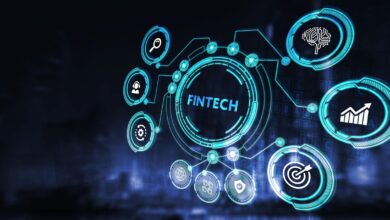Who is the Real End Customer Going Forward? In Conversation: Emirates NBD at Dubai Fintech Summit

In early May, we attended the Dubai FinTech Summit, and got the opportunity to speak with some of the brightest minds in the industry, including Emirates NBD.
Over 8,000 visitors from 118 different countries made the trip to Dubai to learn from industry experts and gain insights from the panels and discussions taking place. One of the trailblazers in the industry many came to see was Emirates NBD, a banking group in the MENAT (Middle East, North Africa and Türkiye) region.
Attendees experienced three headline sessions featuring senior leaders from the bank on the main event stages, as well as exclusive panel discussions at its pavilion. The bank also hosted interactive activations by key business units, showcasing cutting-edge products and innovations designed to educate and engage visitors.

The Fintech Times got the opportunity to sit down with Emirates NBD group chief platform officer, Saud Al Dhawyani to hear about his insights from the event.
Al Dhawyani expressed his enthusiasm about the Summit stating: “It’s a great opportunity to network with peers from other organisations as well as meet a lot of great founders too. You will find the fintechs at all stages of development here: some are at an early stage and others are at the mature stage.
“Some of the most interesting ideas we have seen here have been surrounding payments. We have also seen great innovation in artificial intelligence too, which is something that has started picking up recently. We have also seen a few things in the compliance and regtech area as well.”
Cooperation with fintechs
The Dubai Fintech Summit was a breeding ground for new ideas and partnerships. It allowed many up-and-coming fintechs to talk with incumbents in the field. But is cooperation between banks and fintechs feasible considering fintechs are known to disrupt the ‘status quo’?
Al Dhawyani said: “It depends. It depends on your technology landscape and your architecture and blueprint.
“Banks, naturally are very complex, and some banks would have a higher degree of complexity depending on the age of the technology components.
“Fortunately, we’ve been one of the banks that has made an interesting decision. Five years ago, we transformed our entire technology stack which allowed us to have the ability to seamlessly integrate with any components easily. This allows us to leverage any partner ecosystems and integrate fintechs into the architecture seamlessly.”
As a result of this tech stack change, Al Dhawyani further explained: “Comapred to banks in other regions we are sitting on young technology stacks. We don’t have the legacy tech which can be found in banks in developed markets.
“That gives us much more flexibility and an advantage to adapt. We also have seamless interoperability with modern tech that gives us the ability to be much faster in responding to our customer customer demand and expectations.”
Will the landscape have changed much next year?
2024 was touted to be a year of change for fintech. However, 2025 will undeniably host some different trends that take the world by storm. Concluding Al Dhawyani looked to the future: “I think the conversation around artificial intelligence will mature further, especially with the recent interest from the governments around AI.
“Banks started reaping some of the initial benefits out of AI, generative AI etc. so between this and some advancements from regulators, I believe that we can start talking about how we can integrate with machines and other technologies, rather than solely expecting customers to use our mobile apps.
“I believe that we should think about a car like Tesla banking with with us. Or how would your wearable watch bank with us?
“I think it’s going to be an interesting year. Especially because what we know about customers is going to change. They might not even be a human!”



